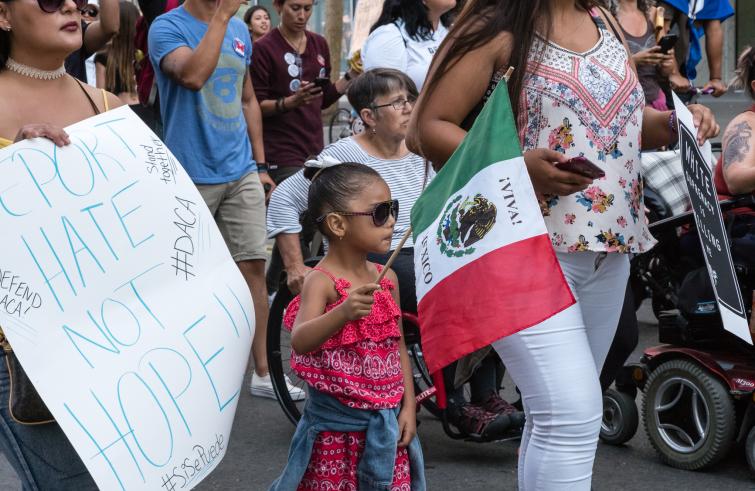
(from New York) Maria was 5 years old when she crossed the border from Mexico into the United States with her mother and father. She always worked and studied very hard to cover the university’s high fees. However, she didn’t manage to complete her studies. She is now 23 and has a daughter that risks being stripped from her if the US Congress should fail to approve the bill providing for the protection of the so-called “dreamers” – undocumented immigrants who entered the United States as children with their parents to accomplish their dream. Maria just ended her working day: she is in charge of shipments. Piles of boxes to be packaged, stocked and shipped. With a broken voice, she keeps on saying:
“I am worried for my daughter.”
In fact Maria risks being deported together with her parents, while the child, a US citizen, risk becoming an orphan. Josè is younger; he’s twenty years-old. He managed to obtain legal papers through the DACA program and enrol in university. He too is a working student in this small city in California, where 30% of the population are youths who entered the US as undocumented migrants together with their families. They succeeded, but many others have died of thirst while crossing the desert. Also Josè risks being deported to Mexico. But how could he ever adapt to an environment he knows nothing about, having been raised in the United States and with no Latino roots? Maria and Josè are only two of 800 thousand youths who plunged into a state of uncertainty on September 5.
On that day the Minister of Justice Jeff Session announced, on behalf of President Trump, the suspension of DACA – Deferred Action for Childhood Arrivals – created by President Obama in 2012. The program allowed some individuals who entered the country illegally as minors before 2007 and immigrants younger than 31 in 2012, to receive a renewable two-year period of deferred action from deportation and to be eligible for a work and study permit, along with a driving license, the authorization to open a bank account, to purchase homes along with the possibility of travelling without running the risk of being expatriated by the Homeland Security Department.
After the suspension President Trump asked Congress to find a legal solution for these youths – , who, without the bill, are at risk of mass deportation and of ending up on street – within the next six months. Olivia, who takes care of many of these families in the parish, still bears the vivid memory of the homeless stranded in villages on the opposite side of the US border. “They are deportees without a family and without a home. They don’t know this world and they are helpless. The impact of the cultural choc undermines their very survival. They left a society with infinite opportunities and don’t know how to adapt to a poor society, they are totally at loss.”

In the meantime, by surprise, on September 13 President Trump announced he would support the dreamers’ program in agreement with the Democrats; that he would step up immigration surveillance and suspend the building of the wall on the Mexican border. In fact, while immigration is a highly divisive issue among the US population at large, the granting of citizenship to DACA youths enjoys the support of US citizenry and of a large number of Trump’s supporters.
Moreover, Trump’s decision did not come as a bolt from the blue. In fact in the past few weeks both the church and civil society have devoted great efforts to voice their concern. The US bishops, after having decried the termination of the program in a statement, called upon the faithful and upon all people of good will to contact their representatives in Congress to urge “the passage of the DREAM Act or similar legislation as a prompt, humane, and durable solution to this problem of greatest urgency.” The Bishops’ Conference firmly opposes the decision to set March 5 2018 as the deadline for DACA renewals and requested to extend the deadline to October 5 especially for the many youths living in hurricane-affected zones. Over the past years, the indecision of Congress –whether with Republican or Democrat majority – had left DACA youths in a state of uncertainty, but the latest decisions have driven thousands of families into despair since the dreamers’ documents contain identifying features of their status and residence as well as those of their parents, who would thus risk being convicted for illegal immigration and face subsequent deportation.
The rectors and deans of 28 Jesuit Colleges and Universities announced they will make every effort to protect their students and adopted a legal system to protect their status. Monsignor M. McShane, President of New York’s Fordham University School of Law, declared in a statement posted on the University’s website: “rescinding DACA throws the lives of 800,000 Dreamers into turmoil, damages our economy, and erodes our national security. For what?” Indeed, compared to 11 million undocumented migrants present in the Country the number of DACA youths is minimal. College students have mobilized support for their “undocumented” peers with leaflets and banners, while a high number of deans have declared that their campuses are “sanctuaries”, namely, places where the immigration agency cannot force the local police to carry out federal immigration laws without evidence of the crime. They massively refused to denounce their students and to adopt the implementation of stricter immigration regulations in their campuses. Upon his return from Columbia Pope Francis expressed the hope that the US President would rethink his decision on the protection of youths since the latter “presented himself as a man who is “pro-life” and a person who is a staunch supporter of the life cause understands that the family is the cradle of life, and its unity must be defended.” The Pope’s hope is shared also by Josè and by Mary, also for her little girl.










